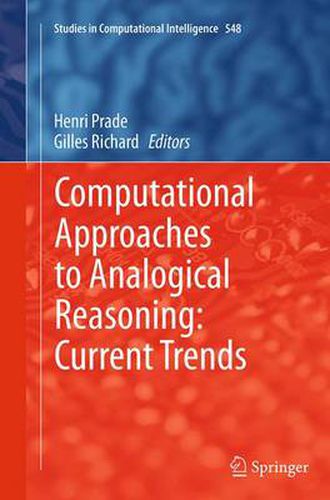Readings Newsletter
Become a Readings Member to make your shopping experience even easier.
Sign in or sign up for free!
You’re not far away from qualifying for FREE standard shipping within Australia
You’ve qualified for FREE standard shipping within Australia
The cart is loading…






This title is printed to order. This book may have been self-published. If so, we cannot guarantee the quality of the content. In the main most books will have gone through the editing process however some may not. We therefore suggest that you be aware of this before ordering this book. If in doubt check either the author or publisher’s details as we are unable to accept any returns unless they are faulty. Please contact us if you have any questions.
Analogical reasoning is known as a powerful mode for drawing plausible conclusions and solving problems. It has been the topic of a huge number of works by philosophers, anthropologists, linguists, psychologists, and computer scientists. As such, it has been early studied in artificial intelligence, with a particular renewal of interest in the last decade.
The present volume provides a structured view of current research trends on computational approaches to analogical reasoning. It starts with an overview of the field, with an extensive bibliography.
The 14 collected contributions cover a large scope of issues. First, the use of analogical proportions and analogies is explained and discussed in various natural language processing problems, as well as in automated deduction. Then, different formal frameworks for handling analogies are presented, dealing with case-based reasoning, heuristic-driven theory projection, commonsense reasoning about incomplete rule bases, logical proportions induced by similarity and dissimilarity indicators, and analogical proportions in lattice structures. Lastly, the volume reports case studies and discussions about the use of similarity judgments and the process of analogy making, at work in IQ tests, creativity or other cognitive tasks.
This volume gathers fully revised and expanded versions of papers presented at an international workshop’ as well as invited contributions. All chapters have benefited of a thorough peer review process.
$9.00 standard shipping within Australia
FREE standard shipping within Australia for orders over $100.00
Express & International shipping calculated at checkout
This title is printed to order. This book may have been self-published. If so, we cannot guarantee the quality of the content. In the main most books will have gone through the editing process however some may not. We therefore suggest that you be aware of this before ordering this book. If in doubt check either the author or publisher’s details as we are unable to accept any returns unless they are faulty. Please contact us if you have any questions.
Analogical reasoning is known as a powerful mode for drawing plausible conclusions and solving problems. It has been the topic of a huge number of works by philosophers, anthropologists, linguists, psychologists, and computer scientists. As such, it has been early studied in artificial intelligence, with a particular renewal of interest in the last decade.
The present volume provides a structured view of current research trends on computational approaches to analogical reasoning. It starts with an overview of the field, with an extensive bibliography.
The 14 collected contributions cover a large scope of issues. First, the use of analogical proportions and analogies is explained and discussed in various natural language processing problems, as well as in automated deduction. Then, different formal frameworks for handling analogies are presented, dealing with case-based reasoning, heuristic-driven theory projection, commonsense reasoning about incomplete rule bases, logical proportions induced by similarity and dissimilarity indicators, and analogical proportions in lattice structures. Lastly, the volume reports case studies and discussions about the use of similarity judgments and the process of analogy making, at work in IQ tests, creativity or other cognitive tasks.
This volume gathers fully revised and expanded versions of papers presented at an international workshop’ as well as invited contributions. All chapters have benefited of a thorough peer review process.